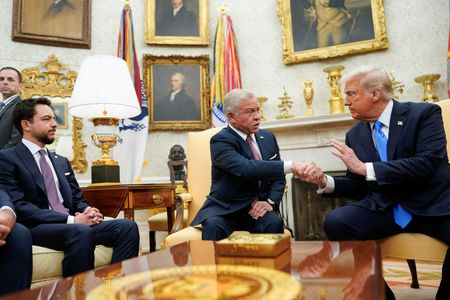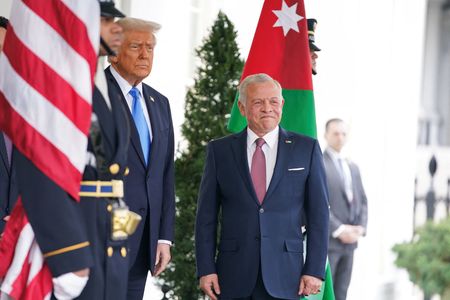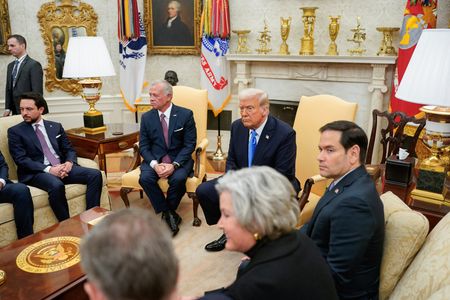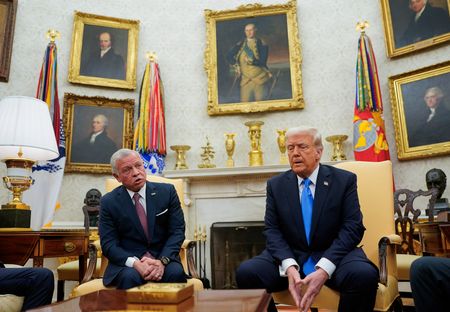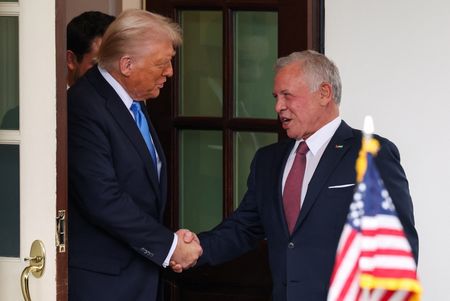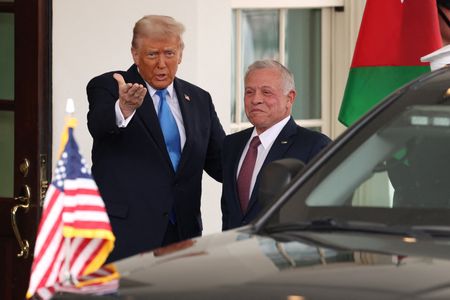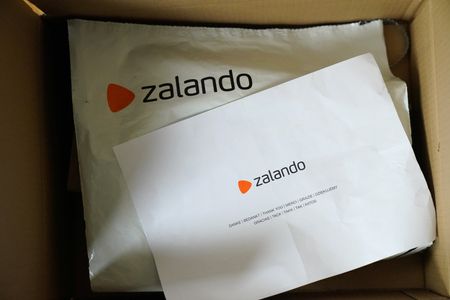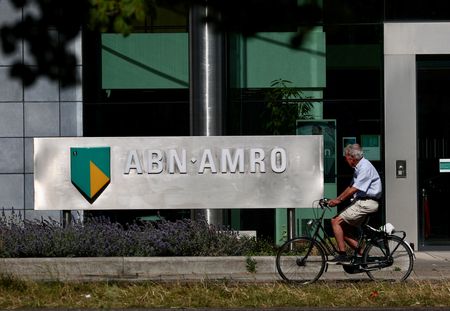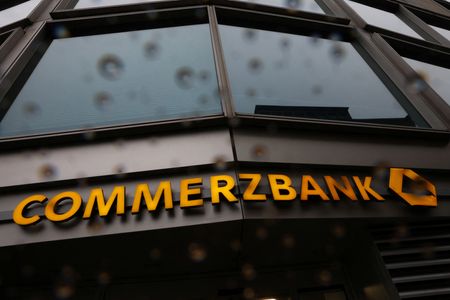By Jeff Mason and Simon Lewis
WASHINGTON (Reuters) – Donald Trump on Tuesday pressed Jordan’s King Abdullah to take in Palestinians who would be permanently displaced under the president’s plan for the U.S. to take over the Gaza Strip, even as the king said his country was firmly opposed to the move.
Speaking alongside the Arab country’s ruler in the White House, Trump signaled he would not budge on his idea that involves moving the Gaza Strip’s shell-shocked residents and transforming the war-ravaged territory into what he billed a “Riviera of the Middle East.”
Trump has infuriated the Arab world by saying that Palestinians would not be able to return to their homes under his proposal to redevelop the enclave, which has been devastated by an Israeli offensive.
“We’re going to take it. We’re going to hold it, we’re going to cherish it. We’re going to get it going eventually, where a lot of jobs are going to be created for the people in the Middle East,” Trump said in the Oval Office, saying his plan would “bring peace” to the region.
King Abdullah said later that he reiterated to Trump Jordan’s “steadfast position” against the displacement of Palestinians in Gaza, as well as in the occupied West Bank that borders his country.
“This is the unified Arab position,” he said in a post on X. “Rebuilding Gaza without displacing the Palestinians and addressing the dire humanitarian situation should be the priority for all.”
Despite the views of his Jordanian counterpart, Trump said Jordan, as well as Egypt, would ultimately agree to house displaced residents of Gaza. Both countries rely on Washington for economic and military aid.
“I believe we’ll have a parcel of land in Jordan. I believe we’ll have a parcel of land in Egypt,” said Trump. “We may have someplace else, but I think when we finish our talks, we’ll have a place where they’re going to live very happily and very safely.”
U.S. ASSISTANCE IN QUESTION
Trump, who has suggested he could consider withholding aid to Jordan, said he was not using support as a threat.
“We contribute a lot of money to Jordan, and to Egypt by the way – a lot to both. But I don’t have to threaten that. I think we’re above that,” Trump said.
King Abdullah has previously said he rejects any moves to annex land and displace Palestinians. He is the first Arab leader to meet Trump since the Gaza plan was floated.
While the two leaders were cordial with each other, Trump’s comments about Gaza put King Abdullah in an awkward position, given the sensitivity in Jordan of the Palestinians’ claim of a right to return to the lands that many fled during the war that surrounded the creation of Israel in 1948.
Trump at one point appeared to prompt King Abdullah to say he would take in Palestinians from Gaza. The king said he would do what is best for his country, but said Jordan would take in 2,000 sick children from Gaza for treatment, an offer that Trump praised.
Arab nations would come to Washington with a counterproposal, he said.
“The point is how to make this work in a way that is good for everybody,” he said, appearing uncomfortable, without explicitly supporting or opposing Trump’s plan.
Jordanian Foreign Minister Ayman Safadi later told state-owned al-Mamlaka TV that there is an Egyptian-led Arab plan to rebuild Gaza without displacing its people.
Jordanian officials ahead of the talks said they wanted to avoid a public engagement where Trump would put the king on the spot, and the remarks inside the Oval Office were not planned.
The two spoke in front of reporters with the king’s son, Crown Prince Hussein, Safadi, Secretary of State Marco Rubio and other officials also present. The king later met a bipartisan group of U.S. senators including John Thune, the Republican majority leader.
Sandwiched between Saudi Arabia, Syria, Israel and the occupied West Bank, Jordan is already home to more than 2 million Palestinian refugees in its population of 11 million, their status and number long providing a source of anxiety for the country’s leadership.
Amman is also reeling from Trump’s 90-day aid pause. Israel and Egypt have been granted waivers, but the $1.45 billion Jordan gets each year remains frozen pending a Trump administration review of all foreign aid.
FRAGILE CEASEFIRE
Trump’s proposal has introduced new complexity into a sensitive regional dynamic, including a fragile ceasefire between Israel and the Palestinian militant group Hamas.
Hamas on Monday said it would stop releasing Israeli hostages from Gaza until further notice, saying Israel was violating the agreement to end strikes that have pummeled Gaza. Trump later proposed canceling the ceasefire if Hamas doesn’t release all remaining hostages it took on October 7, 2023, by Saturday.
Trump said on Tuesday that “all bets are off” if Hamas does not meet the deadline, adding that he does not think the Palestinian militant group will do so.
Three out of four Americans — 74% — in a Reuters/Ipsos poll conducted February 7-9 said they opposed the idea of the U.S. taking control of Gaza and displacing the Palestinians who live there. The poll showed that Republicans were divided on the issue, with 55% opposed and 43% supportive.
(Reporting by Jeff Mason, Simon Lewis and Trevor Hunnicutt in Washington and Suleiman al-Khalidi in Amman; Editing by Colleen Jenkins and Alistair Bell)


